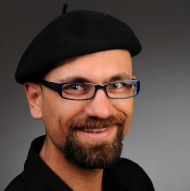Stefan Hartinger is a master’s student in physics at the University of Regensburg. Before starting his master, he already completed a bachelor’s degree in physics – also in Regensburg.
In addition to his studies, he teaches other students the basics of programming. He focuses on the languages C and Python.

High Energy Physics - Chairs of Prof. Braun & Prof. Wettig
Faculty of Physics, Chairs of Prof. Braun and Prof. Wettig
Introduction to programming in C and Introduction to programming in Python
The basics of programming are also the basis for understanding artificial intelligence. The language Python represents a de facto standard for AI development. All of my courses deal with how a concrete reality can be represented digitally, and how a computer handles this data, or how we meet human requirements reflected as computer commands.
My lectures are classic slide presentations followed by computer exercises with mainly transfer tasks. The above-mentioned mapping of a concrete reality and solving of problems (suitable for beginners) are practiced. AI and Big Data are mentioned as an outlook, but given the target group (beginners without prior knowledge), they are not dealt with in more detail.
I react spontaneously to individual questions from students with more extensive previous knowledge, sometimes with literature or course recommendations, sometimes with impromptu examples, in order to bring questions and answers closer to the majority of the course; However, this is an exceptional situation, as the courses do not require any prior knowledge.
I react spontaneously to individual questions from students with more extensive previous knowledge, sometimes with literature or course recommendations, sometimes with impromptu examples, in order to bring questions and answers closer to the majority of the course; However, this is an exceptional situation, as the courses do not require any prior knowledge.
Basics of programming: Problem analysis and synthesis of solutions from elementary language elements.
A basic understanding of AI allows you to make informed decisions at your work and in everyday life. Both the extent of the capabilities and the limitations can only be meaningfully estimated if the logic behind computer operations is known.
I am a master’s student at Prof. Richter’s chair in theoretical physics. The subject of my work are Boson-Sampling Devices.
So far I have passed the following stations: Secondary school leaving certificate; Training as a chemical laboratory assistant; Employment as an analysis technician in the electronics industry; General university entrance qualification by correspondence course; Bachelor and master studies in physics at the UR. In these stations I mainly encountered AI as a “background topic”: for a project at a previous employer, image recognition technologies were supposed to identify faulty components; Questions like “How does the YouTube algorithm work?” or “How does autonomous driving work?” interest me privately.
Question 10: Do you personally find it easy or difficult to deal with topics that are related to AI?
What I have seen so far has been easy.
The variety of possible uses; the “emergent complexity”, which means how the combination of simple methods results in very versatile models.
—
Mr. Hartinger, thank you very much for taking the time to answer these questions. We wish you a nice day!
Mr. Hartinger, thank you very much for taking the time to answer these questions. We wish you a nice day!